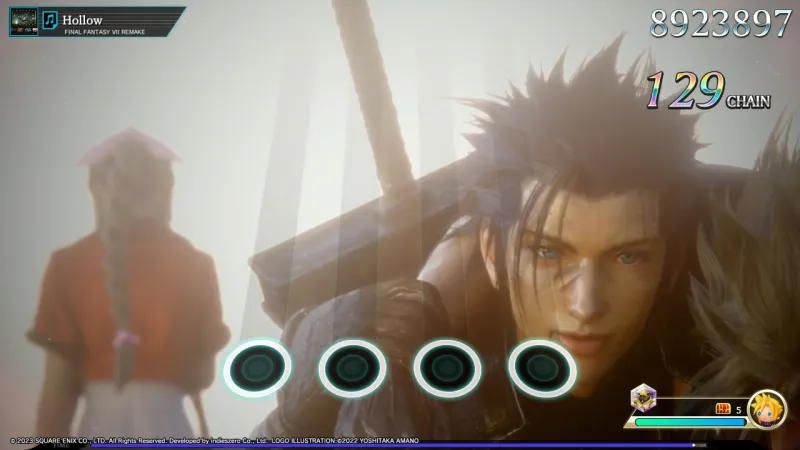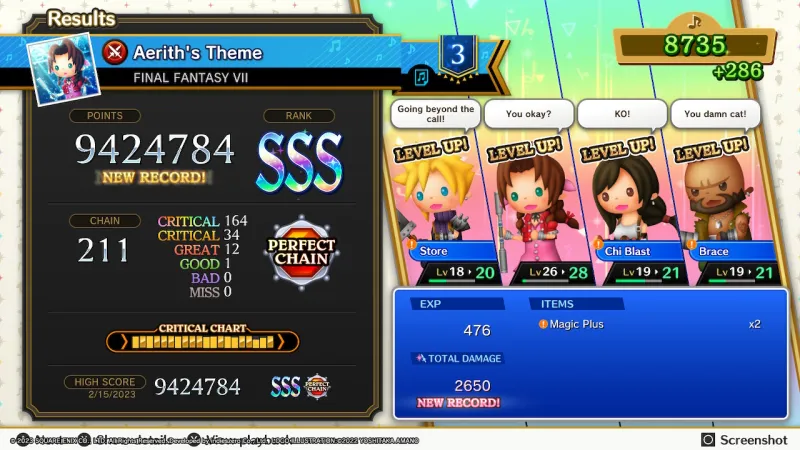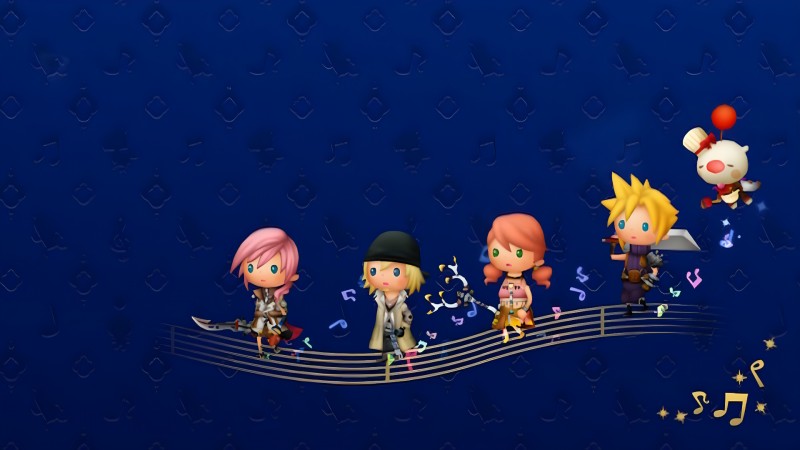The Theatrydm series has been a standout, if criminally underrated, example of how the duo showcases an excellent set of a series celebrating the history of an illustrious franchise. Since the release of the previous entry on 3DS in 2014, Final Fantasy music has evolved due to the release of Final Fantasy XV, Final Fantasy XIV expansions, remakes, and more. Theatridom Final Bar Line adds these additions to a mix of returning classics and lesser-known tunes to create an amazing list of songs that take on the series’ trademark through-the-beat style.
And like 2012 and 2014, it remains as quirky and eclectic as ever. I have a couple of minor gripes with the game, but they rarely matter: The gameplay. This new theatrics sets a high bar for the entire series, continuing the trend of outdoing what came before it and showing just how well a festive series compilation can be done.
There is a lot of familiarity this time around for the returning players. This sequel retains the same chibi art style, the same stage formats, and many of the existing songs. It’s a “don’t fix what ain’t broke” situation and one that works. One big difference is how you hit the notes, due to hardware differences between the 3DS, where the last two games notably resided, and the PS4 and Switch. 3DS games were more tactile as you would use the touch screen stylus to tap notes on the screen. Now, you have to hit the note while scrolling on the screen by pressing the face buttons, shoulder buttons, or slashing directly with the analog stick.
Admittedly, it’s awkward enough at first and I wasn’t a fan of this necessary format change, as the game does little to help you determine an appropriate control scheme. Because you can hit most notes with almost any button on the controller, it’s initially difficult to keep track of where your hands are and where they should go when things get busy. After an hour or so, I settled into a plan that worked for me, but I figured it all out myself. I would have liked more direction from the final bar line, especially in a genre where most games assign specific button presses to specific notes.
After finding what worked for me, I became devilishly ignited through the songs, and my old love for theatridom was rekindled. Both the Field Music stage and the Battle Music stage begin by selecting one of your five party loadouts. Each loadout can contain up to four characters from various Final Fantasy games. I’ve had fun mixing and matching some of my favorites, like Lightning from Final Fantasy XIII and Cloud from Final Fantasy VII, to create offensive-heavy builds. And when boss fights, for example, give me special challenges, I equip magic-focused characters to target the enemy’s weakness alongside more defensive heroes. It’s a new element of strategy that adds a deeper level of engagement for players chasing the highest possible score and jackpot yield in each stage.
This was especially important for completing the Series quest, which are optional objectives associated with each song. Completing these quests can range from defeating challenging enemies to a boss, requiring hitting “important” notes for the duration of a song, or something as simple as completing a stage with a particular character in the party. (usually because that character is connected to the song in some way). These quests add a touch of extra challenge if you want it. They’re also completely optional, which means that if you just want to amp up your Final Bar Line experience by playing through some great songs and staying on beat while doing so, this might be just the thing.
I wish quests were more integrated into the primary progression. While they are not essential to progress, completing them brings rewards. But sometimes the reward is lousy, like a potion, which is an item I rarely use. Other times, it’s even better, like when you earn a collectacard that shows a key Final Fantasy moment in trading card style. Still, because these extra challenges are optional, I rarely felt compelled to give them more than a couple of tries. If I fail miserably at a song, I’ll just move on because there’s no penalty for doing so. Completing the song is essential to move on.

One of my favorite aspects of the Final Bar line is unlocking the special event Music Stage, which allows you to play through songs while cinematics from the game play behind the notes. It’s a nice touch and adds a premium level of quality to the nostalgia factor of the game. The in-game museum helps on that front as well, as you can view your collect cards anytime. Looking at the promotional art I forgot there was a particularly cool treat in existence for some Final Fantasy games, but other cards better resemble in-game characters or enemies in their chibi designs. It’s a great addition to players looking to play 100 percent and perfectly captures the celebratory nature of the final bar line.
Outside of the game’s single-player offerings, there are multiplayer battles. Here, you can compete with up to three other players, and I enjoyed how it changes the gameplay. Other players’ successes trigger effects on your screen, such as the “Fat Chocobo” mob that sends a fleet of large chocobos across your screen, obscuring incoming notes. Others remove the UI that tells you how well you’ve hit a note, which has a surprisingly negative effect on my performance. And the most challenging effect sent by an opponent adds counterfeit notes to my scrolls. It’s an exciting and stressful way to play through my favorite Theatrirhythm songs and a sure way to increase my play time with the game. The same goes for the Endless World stage, which lets you play track after track until you run out of HP.

The final bar line does little to propel you through any of this, though. Barely a fraction of a story, and I rolled the credits without realizing I was near the end—I’d only completed about a third of the 385 tracks. You can earn new summons, which play automatically during a stage based on your rhythmic action from other players in Multi Battle, and you can go for high scores by replaying songs, but the final bar line Doesn’t emphasize why you should do this.
Despite the lack of propelling factor, I still find myself completely engrossed in the game, playing it during any 15 minutes I can find throughout my day. Although I’ve technically completed the game, I want to SSS rank all my favorite songs, dig deeper into libraries from Final Fantasy games I’m less familiar with, and test my rhythm against other players. I perform This is a great rhythm game set to the tunes of what is definitely the greatest music catalog in all of games. While I would have liked more guidance on how to proceed, the musical material on offer is so varied, so nostalgic and so well done that I have no problem composing my own fun.
